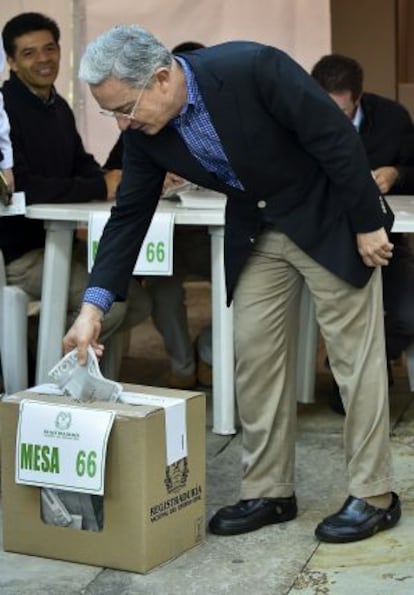Challenger Zuluaga wins first round of voting in Colombian elections
Result is blow to incumbent President Juan Manuel Santos and his peace talks with FARC guerrillas


The Colombian government’s ongoing negotiations with the FARC guerrilla group have deeply divided voters during the first round of presidential elections held there on Sunday.
Opposition candidate Óscar Iván Zuluaga, a firm opponent of the talks, obtained 29.2 percent of the vote, compared with 25.6 percent for the incumbent, President Juan Manuel Santos.
Zuluaga, a follower of former president Álvaro Uribe, had risen quickly in popularity thanks to his rhetoric of zero tolerance for the FARC and the promise that he will suspend all talks until the guerrilla group “ends all criminal action.”
The spying scandal in which he has been caught up in recent weeks does not seem to have hurt Zuluaga, who claimed that a video showing him in the company of a hacker who spied on the FARC-government talks was simply a set-up designed to make him lose the elections.
The constant volley of accusations has obscured other issues that affect Colombians
“We cannot let the FARC rule Colombia from Havana!” yelled an exultant Zuluaga before a crowd of supporters, in reference to the Cuban capital where the secret negotiations are taking place.
“If the president allows impunity for those who committed atrocious acts and crimes against humanity, he will send the message that being honest or being a criminal is all the same,” he warned, tapping into the fears of many Colombians that guerrilla leaders will not go to prison if a peace deal is signed. He has called for “peace without impunity.”
Meanwhile, Santos has based the success of his re-election on the talks, which means that Sunday’s results put him in a delicate position with a view to the second round of voting on June 15.
The president had asked Colombians to join his “crusade for peace” and portrayed their choice between “those of us who want the end of war and those who prefer a war without end.”
President Santos had asked Colombians to join his “crusade for peace”
The latest polls from a week ago were predicting a technical tie in round two, which, if true, gives added importance to potential alliances with the other three contenders in the running.
The conservative Marta Lucía Ramírez obtained 15.5 percent of the vote, followed closely by the leftist Clara López with 15.2 percent. Meanwhile, former Bogotá mayor Enrique Peñalosa and the Green Alliance only managed 8.3 percent.
Voter turnout was particularly low at 39 percent, but those who came out to the polling stations seemed to have clear opinions on why they were supporting one or the other candidate.
“I will vote for Santos not because of him, but for peace and for my country,” said Cristina Cerón, 56. “They have been negotiating for a year, and if the guerrillas have not left the table yet, there is a reason for that.”
We cannot allow people who have killed and kidnapped to sit in Congress”
But Alexandra Villamizar, 51, a commercial director for an airline, said she was voting for Zuluaga. “At stake is our democracy. We cannot hand the country over to the FARC or allow people who have killed and kidnapped to get a seat in Congress.”
While Colombians are divided over the issue, there is enormous international support for Santos’ project in the hope that it will end a war that has resulted in 220,000 deaths and nearly six million displaced.
The constant volley of accusations between the two main contenders during campaigning has obscured other issues that affect Colombians, including citizen insecurity and economic inequality.
“They are not giving opportunities to small businesses,” said Ricardo Jiménez, 56. “I used to have seven employees on contract. Now I pay them on a day-by-day basis, I can’t guarantee them any more than that.”
Tu suscripción se está usando en otro dispositivo
¿Quieres añadir otro usuario a tu suscripción?
Si continúas leyendo en este dispositivo, no se podrá leer en el otro.
FlechaTu suscripción se está usando en otro dispositivo y solo puedes acceder a EL PAÍS desde un dispositivo a la vez.
Si quieres compartir tu cuenta, cambia tu suscripción a la modalidad Premium, así podrás añadir otro usuario. Cada uno accederá con su propia cuenta de email, lo que os permitirá personalizar vuestra experiencia en EL PAÍS.
En el caso de no saber quién está usando tu cuenta, te recomendamos cambiar tu contraseña aquí.
Si decides continuar compartiendo tu cuenta, este mensaje se mostrará en tu dispositivo y en el de la otra persona que está usando tu cuenta de forma indefinida, afectando a tu experiencia de lectura. Puedes consultar aquí los términos y condiciones de la suscripción digital.








































